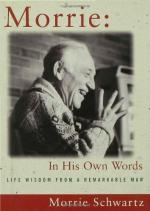
|
| Name: _________________________ | Period: ___________________ |
This test consists of 5 multiple choice questions, 5 short answer questions, and 10 short essay questions.
Multiple Choice Questions
1. What method does Schwartz use to develop a sense of detachment?
(a) Discussing his problems with a professional.
(b) Focuses on other activities.
(c) He sleeps a lot.
(d) Meditation.
2. Schwartz emphasizes that no matter how bad life gets, one should always keep their heart open to whom?
(a) Strangers.
(b) Doctors and nurses.
(c) All others.
(d) Just family.
3. The article in the newspaper lead to an interview on what national news program?
(a) 20-20.
(b) The Today Show.
(c) 60 Minutes.
(d) Nightline.
4. Schwartz explains that one must treat themselves as they would treat _____________.
(a) A clergy member.
(b) A friend.
(c) An enemy.
(d) A mother.
5. Being involved in favorite activities will help one _____, according to Schwartz.
(a) Cope.
(b) Recover.
(c) Feel physically stronger.
(d) Forget about the disease.
Short Answer Questions
1. Schwartz states that even though one is ______ it does not mean that friendships cannot still be developed.
2. In Chapter 10, Schwartz discusses that it is important for the sufferer to develop a connection with whom?
3. Schwartz must learn to become more _____ as the disease worsens.
4. Today, what religion does Schwartz find himself drawn to?
5. Schwartz states that we must be able to _____ what is going on inside of us.
Short Essay Questions
1. At the end of Chapter 6, Morrie explains how he became well-known. Explain the process which leads to Morrie being in the public eye.
2. In Chapter 7, Morrie discusses relationships and making new friends. Describe how Morrie's social group of friends transformed after he was diagnosed with his illness.
3. In Chapter 10, Morrie describes his past religious experiences. What was Morrie's childhood religion? What worldwide event changed his religious views?
4. In Chapter 7, Morrie discusses how one in declining health should act when trying to relate to others. Explain the traits that Morrie states one should have when relating to others.
5. In Chapter 10, Morrie discusses the importance of spiritual connection. Explain Morrie's view on the importance of a spiritual connection and why one who is experiencing declining health needs this connection.
6. In Chapter 8, Morrie discusses the importance of relating to one's self. Explain Morrie's thoughts on relating to one's self.
7. In Chapter 9, Morrie explains the importance of "emotional space." What is emotional space, and why is it important to one experiencing declining health?
8. In Chapter 8, Morrie stresses the importance of having time alone. Explain why alone time is so important to someone who is ill.
9. In Chapter 6, the reader learns how Morrie started writing. Discuss what Morrie wrote and why he started writing.
10. In Chapter 8, Morrie discusses newly found freedom of being whom you want to be. Explain this freedom and why it suddenly occurs.
|
This section contains 1,032 words (approx. 4 pages at 300 words per page) |

|




